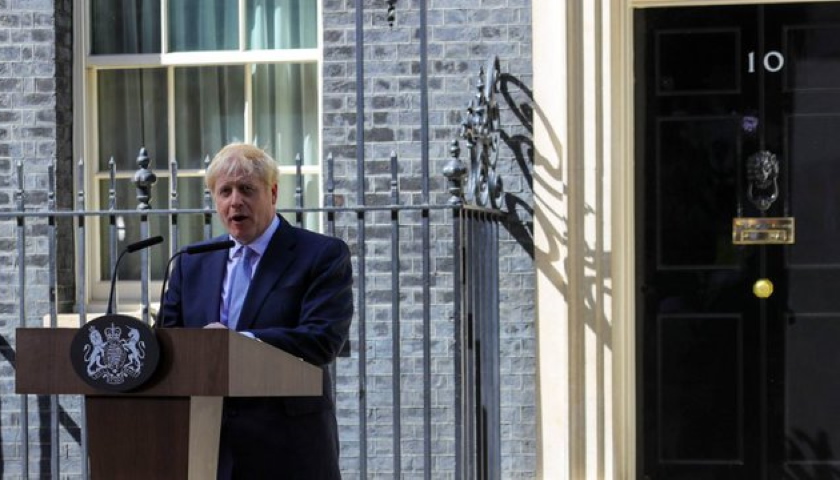Weekly roundup: Are actions stronger than words for Johnson and the NHS?

It’s usually important for a new Conservative Party prime minister to make pledges within their first month in office to boost funding for the ever-struggling NHS – an effect of the UK public’s scepticism around the Party’s commitment to the Health Service.
Former PM Theresa May, for example, promised an extra £20.5 billion a year for the NHS by 2023-24.
But it is even more important for her successor, Boris Johnson, who last week announced his own funding plans under the growing shadow of Brexit
Johnson is no stranger to NHS pledges – in 2016 he spearheaded the Leave campaign with the now-infamous claim that exiting the EU would free up £350 million a week for Britain to spend on the health service, and plastered the claims across the campaign buses.
This claim may well have clinched him victory in the referendum, but it came under intense criticism even during the campaign, was called a ‘mistake’ by Breixteer-in-chief Nigel Farage the day after the result, and there has been no solid commitment to fulfil it by pro-Brexit politicians since.
Nevertheless, Johnson will be hoping his new funding will be seen as him making good on these claims – even if it's the spirit of the promise rather than the strict wording.
Prof John Hall
This is even more important when Johnson, a more outspoken leaver than May, has promised to take the UK out of the EU by October 31st even if a new deal with the bloc cannot be struck.
Many in the healthcare and pharmaceutical industries have warned that a ‘no deal’ scenario would disrupt supplies to essential drugs whilst exacerbating staff and funding issues in the NHS.
On Friday, the Royal Society and other science groups reiterated that no deal would be the “worst option” for UK science.
They did, however, welcome another proposal announced by Johnson last week to introduce a fast-track visa scheme to make it easier for top scientists to work in the UK, amid reports that Brexit is already discouraging researchers from coming to the country.
The Royal Society said it “has long called for reform of the UK’s costly and complex visa system which acts as a barrier to attracting the best international talent.”
Johnson said he will ask the Home Office and the Department for Business, Energy and Industrial Strategy to develop the new system, whilst also scrapping the current cap on so-called “tier one” visas for skilled migrants – currently set at 2,000 per year.
“To ensure we continue to lead the way in the advancement of knowledge, we have to not only support the talent that we already have here, but also ensure our immigration system attracts the very best minds from around the world,” he added.
Along with abolishing the tier one cap, the plans also involve expanding the pool of UK research institutes and universities able to endorse candidates, setting up criteria that would allow automatic endorsement, and removing the need to have an offer of employment before arriving into the country.
Johnson also reiterated the government’s plan to provide additional funding for scientists who had sought EU financial support after the UK leaves the EU, and would instruct UK Research and Innovation (UKRI) to review Horizon 2020 applications stuck in the approval process and provide funding for those that are successful.
That has also been welcomed in many quarters, but eminent UCL neuroscientist Prof John Hardy was sceptical, saying: “the strategy of promising more help to every sector of the economy which will be damaged is simply not credible.”
He also cautioned that “a no-deal Brexit is already reducing Britain from a world science superpower to an also-ran in Europe. More money always helps but science is about collaboration across borders and even the threat of a hard Brexit is seriously damaging to our national interests.”
Funding plans
The bigger headlines, though, came from Johnson’s new cash injections for the NHS.
The first piece of funding, announced on Monday, was £1.8 billion to go towards new equipment and upgrades to 20 hospitals, as well as clearing the estimated £6 billion backlog of maintenance projects for the health service.
Johnson said the funding would mean “more beds, new wards, and extra life-saving equipment to ensure patients continue to receive world-class care”.
He added: “It’s time to face up to this challenge and make sure the NHS receives the funds it needs to continue being the best healthcare service in the world.”
Sceptics were quick to criticise Johnson’s claims.
The Nuffield Trust’s chief executive Nigel Edwards said that the money is “only a fraction” of what is needed to really upgrade 20 hospitals, while Ben Gershlick from The Health Foundation called the money a “drop in the ocean” thanks to “years of under-investment in the NHS’ infrastructure”.
Meanwhile, Danny Mortimer, deputy chief executive of the NHS Confederation and chief executive of NHS Employers, described the funding as “desperately needed” to modernise services and working environments and improve the quality and efficiency of patient care.
Mortimer also said other promises by the prime minister to tackle the social care crisis were welcome, but that Johnson’s words would be “meaningless” without concrete action to back them up.
The government continued the week by promising to reassess proposals on how to tackle the ongoing row over doctor’s pensions, and then on Thursday Johnson announced £250 million of funding for the NHS to set up a national artificial intelligence (AI) lab to enhance care and research.
Johnson said the lab will work on ways to use AI to improve the detection of diseases and automate admin tasks to free up staff to care for patients, amongst other things.
“The NHS is leading the way in harnessing new technology to treat and prevent, from earlier cancer detection to spotting the deadly signs of dementia,” Johnson said.
Health secretary Matt Hancock added that the NHS was “on the cusp of a huge health tech revolution that could transform patient experience by making the NHS a truly predictive, preventive and personalised health and care service”.
AI, along with other digital tech and genomics, was at the forefront of the government’s long term plan for the NHS, unveiled in January.
Earlier this year the Topol Review of the training needs of the future NHS workforce recommended an increase in the number of clinicians trained to use digital, AI and robotics technologies.
And life sciences tsar Sir John Bell has predicted that the NHS could save billions of pounds by using AI to diagnose scans for heart disease and lung cancer.
It’s impossible for anyone to know for certain whether or not Britain will leave the EU without a deal on October 31st (or indeed if Brexit will happen at all on that date), and uncertainty remains the only consistency in UK politics at the moment.
Johnson’s pledges, then, are an attempt to demonstrate continuity and continued priority for the NHS in a post-Brexit world. As with almost everything Brexit related, though, it’s almost impossible to know what the actual effects of these policies will be.











